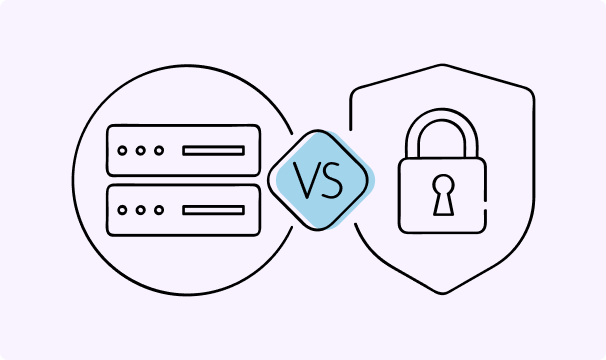Proxy vs VPN: Which is Better for Privacy and Security?
Both proxy servers and a Virtual Private Network (VPNs) protect user identities and help access online content securely. These tools can help surf the web anonymously and are otherwise highly similar, so people tend to mix them.
Yet, a proxy and a VPN are not the same and each of these tools can help with different tasks. To help you identify the best solution for your specific needs, here you’ll find the definitions of a proxy and a VPN.
Moreover, here you’ll also find a proxy vs VPN comparison and learn about each of their pros and cons. Considering these tools’ speed, security, privacy, and price will help you understand which tool to choose for your case.
By the end of this guide, you will have a clear understanding of what proxies and VPNs are, how they work, and differ, and which tool to use in different situations. Let’s dive in!

Adomas Šulcas
6 min read

What Is a Proxy?
A proxy server is a middleman standing between a website you’re accessing and your device. A proxy hides your original IP address, so the website you’re visiting sees your traffic as if it were coming from a different IP. Therefore, the target website doesn’t see any of the information about you that an original IP address reveals, such as location and Internet Service Provider (ISP).
A proxy server works on an application level. This means that it only routes your internet traffic coming from one application.
There are many different types of proxies:
- Residential proxies come from ISPs and are real IP addresses similarly. Much like a residential VPN service, they are more expensive and slower, but target websites don’t tend to block them, since they are real users’ IP addresses.
- Datacenter proxies come from data centers around the world. They are faster and cheaper, but websites can identify them as datacenter IP addresses and may block them.
- HTTP proxy server routes all your traffic through HTTP servers. These proxies add an extra security layer to your servers as they can detect and block suspicious data, such as spyware.
- HTTPS proxy servers are similar to HTTP proxies but they focus on a different protocol - HTTPS.
- SOCKS5 proxy - SOCKS is an internet protocol. SOCKS5 is its latest edition. SOCKS5 proxy server cannot interpret web data so it’s mainly used to run communication with sites with a firewall or limited regular client access.
Common Proxy Use Cases
Proxy servers help bypass geographical blocks. For example, some content may not be available in your country, but using a proxy from a different location will make that content available to you.
Moreover, connecting to a proxy server helps shield your identity. Each IP address carries certain information, such as location (sometimes even to the street level) and internet service provider. Using a proxy IP protects user identity.
Proxy Advantages
Simple automation tasks can be carried out faster using proxies. Some proxy server types can offer a faster IP address, so depending on the complexity of your tasks, you can get things done quickly.
You can also change IP addresses for every request you send, if you wish. Moreover, if one IP gets blocked, you can set up the system to pick another proxy and carry on with the task.
Proxy prices may vary depending on their type, but most proxies aren’t too expensive. So if you only need a few proxies, you can get away without spending too much money on them.
Proxy Disadvantages
One of the main disadvantages of most proxy servers (with an exception of HTTPS proxies) is that they don’t encrypt internet traffic, they only shield the original IP address. Moreover, most proxy servers don’t offer any protection against potential security risks, such as data leaks.
Using a free proxy server is also risky since these IPs can be slow if used by multiple people at the same time. They can also already be blocked by other users and simply won’t work.
Last but not least, proxy integration may be quite difficult for those who’ve never done it before. Setting up a VPN service for the first time is much more intuitive.
What Is a VPN?
A Virtual Private Network (VPN) creates a secure connection between you and the internet. All the traffic coming out of your device is routed through a remote server and via an encrypted digital tunnel. A VPN client hides your IP address but contrary to a proxy, a VPN does it on an operating system level, so all of your traffic is secured.
Using a VPN connection means that not even your ISP can see what you’re doing online, and that's basically what is a VPN. All they can see is that you’re connected to a VPN server. So you’re protected from website tracking, hackers, and other kinds of surveillance.
Common VPN Use Cases
There are so many reasons for why use a VPN that we'll only mention the main ones. Connecting to a VPN server provides full anonymity online and protects your privacy. You can then surf online safely and securely use public Wi-Fi, which may otherwise be risky.
Another common reason for using VPN services is the ability to access geo-blocked content. It’s not a secret that video streaming platforms offer different content across countries. Using a VPN can help you access content that otherwise wouldn’t be available from your original location.
VPN Advantages
VPN servers create military-grade encryption. You can rest assured your internet traffic is secured if you’re connected to a VPN.
Moreover, a VPN protects all the traffic coming out from your device, unlike proxies that work on an application level. You can just turn on the VPN once and not think about it again until you turn off your device.
VPN Disadvantages
VPN connections have some downsides. For example, slower speed due to encryption. Moreover, VPNs work on OS level, which means you can’t use a VPN for a single application, which may be required for some tasks. Although most such issues can be solved by learning how to turn off VPN when needed.
VPN services are also more expensive compared to proxy servers, and prices can greatly vary depending on a VPN provider. Usually, only residential VPN provider are significantly more expensive than proxies.
When to Use a Proxy vs a VPN
Whether to use a proxy IP address or a VPN can depend on the situation. The best situations to use a proxy are when you need to bypass region restrictions for casual browsing, or when privacy isn't a top priority.
Meanwhile, the best situations to use a VPN connection include streaming geo-blocked content, for example on Netflix or Hulu. You should also always use a VPN for security on public Wi-Fi.
And if you’re a journalist or an activist and your job requires full anonymity and privacy, then you should also choose a VPN over a proxy server because the VPN encrypts your internet traffic and provides better protection online.
It is also important to consider the legality of both tools. Due to legal differences, in some countries, one might be illegal. Make sure to check are VPNs legal in your country.
Can You Use a Proxy and VPN Together?
Technically, you can use a proxy server and a VPN client together. However, it can be difficult to configure this combination correctly and your internet connection might become slower. It might also create problems of VPN not connecting.
Connecting to both a proxy server and a VPN doesn’t really create any benefits. It’s better to choose one tool depending on what you intend to do online and how much protection you require.
How to Choose Between a Proxy and VPN
When you’re choosing between a proxy server and a VPN, here are the main factors to consider:
- Purpose - depending on your goal you may need either more speed or more security. Deciding on this will suggest which tool is best for your case - a proxy server, if you need more speed and a large number of IPs, and a VPN if you prioritize security.
- Budget - VPNs are more expensive per IP than proxies, so consider how much you can invest in your security online.
- The level of anonymity needed - VPN will provide a higher level of anonymity compared to proxy servers. Proxies only shield your IP address, while a VPN client encrypts all traffic.
- Geographic location - some niche geographic areas can only be available via a proxy server.
Conclusion
Comparing proxy vs VPN side-by-side shows that these tools will both provide protection online but they have different strengths and weaknesses. Depending on your goal choose one solution that will be the best for your case.
If you prefer speed and have a more restricted budget, you may want to consider connecting to the internet via proxy servers. Meanwhile, VPN services will cost you more and work slower but they can offer a higher level of security by encrypting all of your online traffic.
What is more secure, proxy or VPN?
VPN is more secure than a proxy because it encrypts internet traffic and works on an operating system level rather than an application level.
Can a proxy hide my IP address?
Yes, a proxy hides your IP address by replacing it with a different one.
Is a VPN slower than a proxy?
Yes, a VPN is slower than a proxy, because it encrypts all the traffic.
Can I use both a proxy and a VPN for gaming?
You don’t need to use both a proxy and a VPN. A VPN is enough to secure your traffic for gaming.
Are there free VPNs or proxies that are safe to use?
You may be lucky to find some reliable free proxies or a VPN provider. However, since these tools are meant to protect your traffic, you shouldn’t risk and trust offers that look too good to be true. You may end up downloading malware or giving away sensitive data.

Author
Adomas Šulcas
Chief Operating Officer at Growth Bite
Adomas is a technical writing expert who founded Growth Bite, a digital marketing company, focused on providing high-value SEO and content marketing services to SaaS companies.
Related articles
4 min read
Ethernet vs Wi-Fi: Which One is Better?
Ethernet and Wi-Fi are the two main ways to connect your computer to the internet. While Wi-Fi has received significantly more attention in recent years, especially among consumers, due to its simplicity and flexibility, ethernet is still widely used in various other applications.
Even if Wi-Fi is significantly more popular, it isn’t strictly better. Both methods have their benefits and drawbacks. Wi-Fi’s popularity comes from its ease-of-use and flexibility, but an ethernet connection can be much more useful in certain scenarios.

Adomas Šulcas

5 min read
How to Change Chrome Proxy Settings: The Ultimate Guide
A proxy server is an easy alternative to a VPN that can perform most of the functions of the latter. It’s a server that stands between your device and the destination server, taking your connection requests and forwarding them in your name.
Destination servers in almost all cases see the proxy server as the originator of the request. As such, proxies are widely used in various, mostly business-related applications whenever privacy, security, location changing, and several other factors are at play.

Guoda Šulcaitė